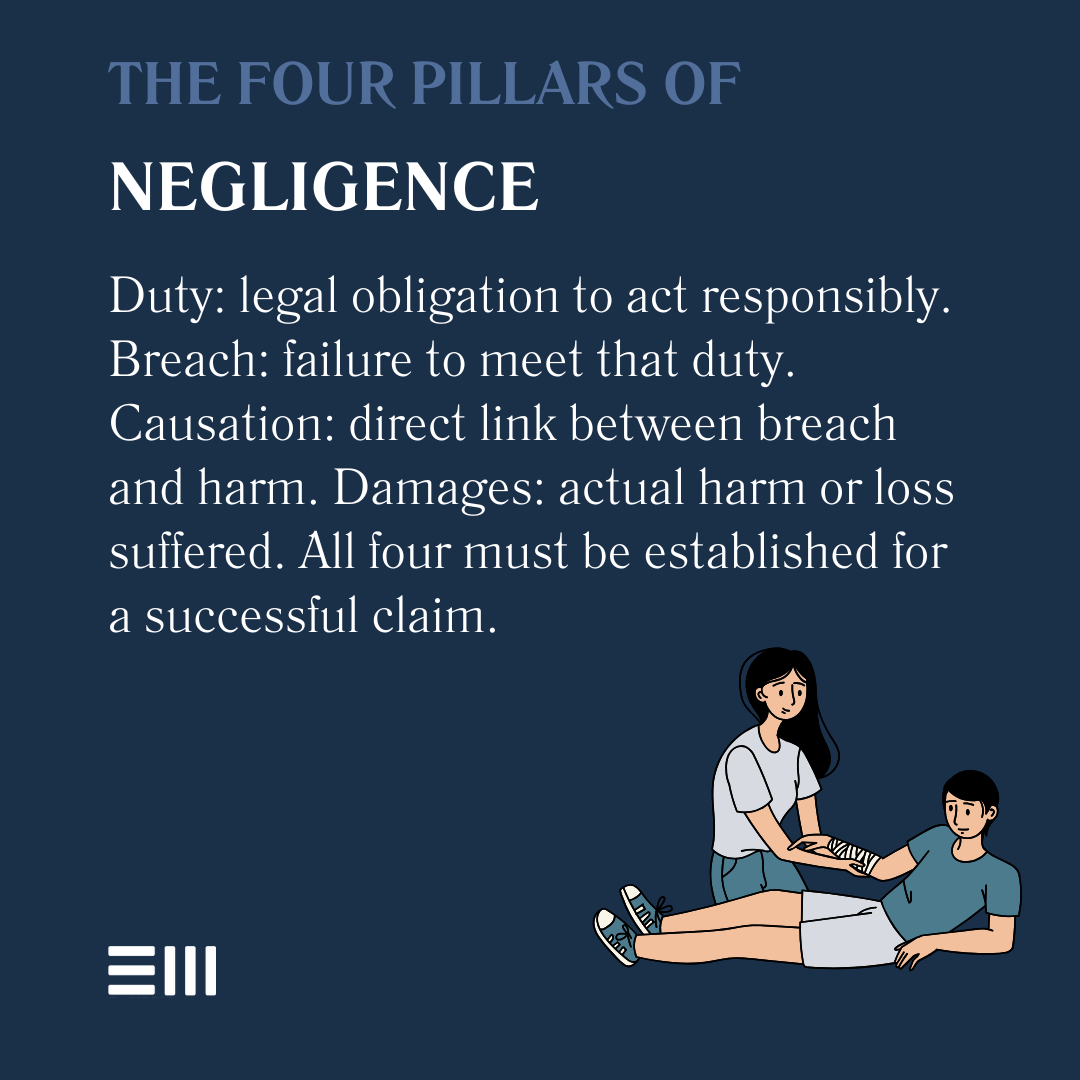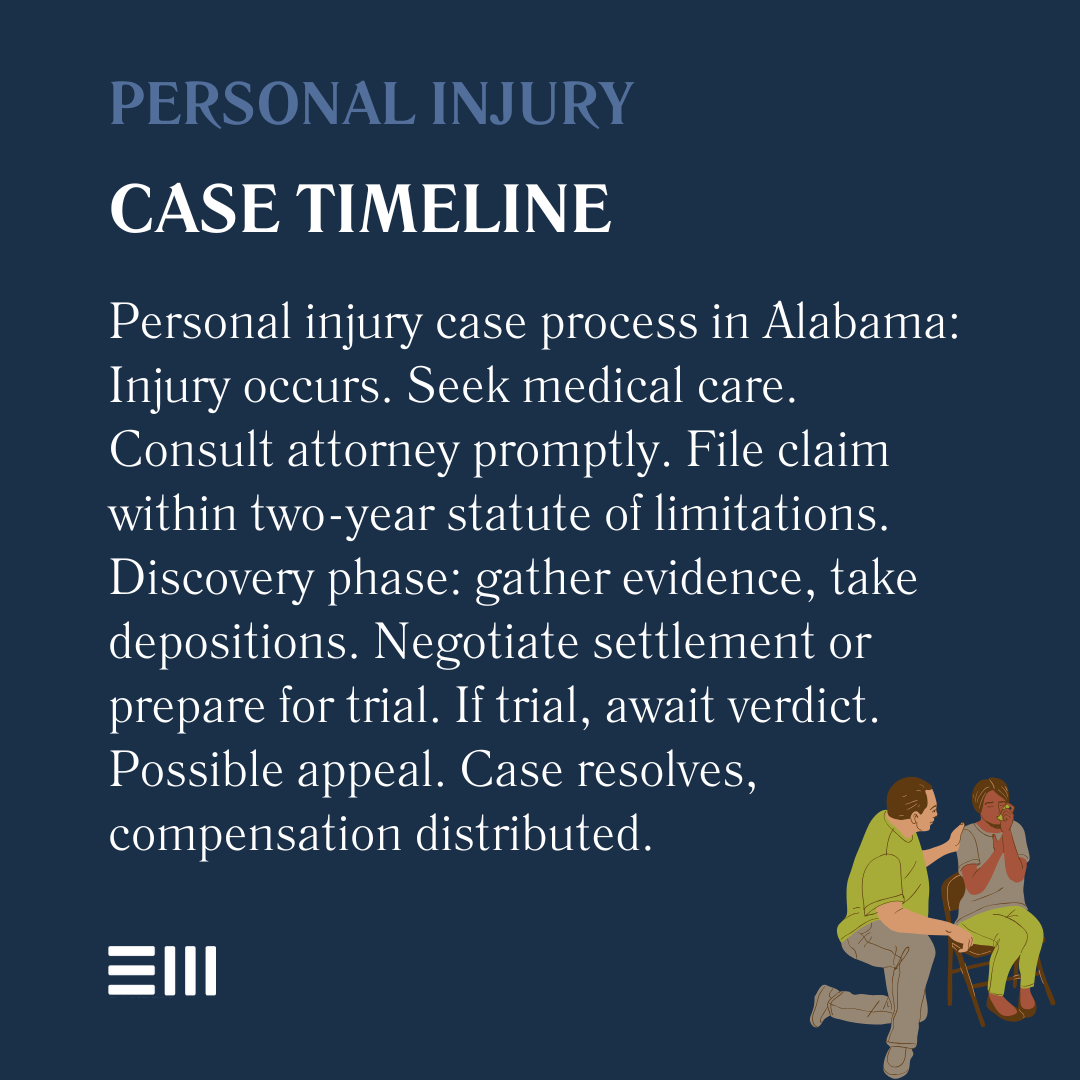Imagine standing in a courtroom, your future hanging in the balance, as a flurry of unfamiliar terms swirls around you.
The judge speaks of "negligence" and "liability," while attorneys debate "damages" and "depositions."
Welcome to the world of personal injury law, where knowledge truly is power.
Understanding the Basics
Legal terminology forms the backbone of personal injury cases. Grasping these terms empowers you to navigate the complex world of law with confidence and precision.
Various legal concepts are involved from the moment an incident occurs to the final resolution of a case.
Understanding these terms will help you communicate better with your legal team and make informed decisions throughout the process.
Key Terms in Personal Injury Law
Navigating personal injury law requires familiarity with a specific set of terms that form the foundation of these cases.
Negligence
Negligence forms the cornerstone of many personal injury cases. It refers to a failure to exercise reasonable care, resulting in harm or injury to another person.
In Alabama, proving negligence requires demonstrating four elements: duty, breach, causation, and damages. Each element plays a crucial role in establishing a strong personal injury claim.
Liability
Liability denotes legal responsibility for one's actions or inactions. In personal injury cases, determining liability is often the first step toward seeking compensation.
Alabama follows the contributory negligence rule, which can significantly impact liability determinations.
Under this rule, if a plaintiff is found even slightly at fault for their injury, they may be barred from recovering damages.
Damages
Damages represent the monetary compensation awarded to an injured party. They aim to make the victim "whole" again, at least from a financial perspective.
In Alabama, damages may include economic losses like medical bills and lost wages, as well as non-economic damages such as pain and suffering. Understanding the types of damages available can help you assess the potential value of your claim.
Statute of Limitations
The statute of limitations sets a deadline for filing a lawsuit. In Alabama, the general statute of limitations for personal injury cases is two years from the date of the injury.
Missing this crucial deadline can result in the loss of your right to seek compensation. It's essential to be aware of this timeframe and act promptly to protect your legal rights.
Tort
A tort is a civil wrong that causes harm or loss to another person. Personal injury law falls under the broader category of tort law.
Understanding the concept of torts helps in grasping the fundamental principles underlying personal injury claims and the legal remedies available to victims.
The Legal Process: From Filing to Resolution
The journey of a personal injury case follows a structured path through the legal system, marked by several key stages.
Complaint
The complaint is the initial document filed with the court to start a lawsuit. It outlines the plaintiff's allegations against the defendant and the legal basis for the claim.
Filing a well-drafted complaint sets the tone for your case and can significantly influence its trajectory. It's crucial to include all relevant facts and legal arguments in this document.
Discovery
Discovery is the pre-trial phase, where both parties exchange information relevant to the case. This process can involve document requests, interrogatories, and depositions.
Effective use of discovery tools can uncover crucial evidence to support your claim. It's a critical stage that often shapes the outcome of personal injury cases.
Deposition
A deposition is an out-of-court testimony given under oath. It allows attorneys to gather information from witnesses and parties involved in the case.
Depositions can be pivotal in personal injury cases, providing valuable insights and sometimes leading to early settlements. Proper preparation for a deposition is essential to protect your interests.
Settlement
A settlement is an agreement between the parties to resolve the case without going to trial. Most personal injury cases in Alabama are resolved through settlements.
Understanding the pros and cons of settling versus going to trial is crucial. Factors like time, cost, and certainty of outcome often influence settlement decisions.
Verdict
If a case goes to trial, the verdict is the final decision rendered by a judge or jury. It determines the outcome of the case and any damages to be awarded.
While verdicts can potentially result in higher awards, they also come with more uncertainty and longer timelines compared to settlements.
Insurance Terms You Should Know
Navigating insurance terms can be challenging, but understanding these key concepts can make a difference when dealing with a personal injury claim. Here are a few essential terms to know.
Policy Limit
The policy limit is the maximum amount an insurance company will pay for a covered loss. Understanding policy limits is crucial when assessing potential compensation in a personal injury case.
In Alabama, minimum auto insurance requirements are relatively low, which can impact recovery in serious injury cases. Knowing the applicable policy limits helps set realistic expectations for your claim.
Adjuster
An insurance adjuster is a professional who investigates claims and negotiates settlements on behalf of the insurance company. Dealing with adjusters is a common part of the personal injury claim process.
While adjusters play a necessary role, it's important to remember that their primary loyalty is to the insurance company. Having legal representation can help level the playing field in negotiations.
Subrogation
Subrogation refers to an insurance company's right to recover payments made on a claim from a third party responsible for the loss. This concept often comes into play in personal injury cases involving multiple parties or insurance policies.
Understanding subrogation can help you navigate complex settlement negotiations and ensure you're not left responsible for repaying insurance benefits from your settlement.
Medical Terms in Personal Injury Cases
In personal injury law, medical terminology often intertwines with legal concepts, creating a unique vocabulary crucial to your case.
Medical Lien
A medical lien is a claim against a personal injury settlement or verdict to recover the cost of medical treatment provided. Healthcare providers often file liens to ensure payment for services rendered.
Navigating medical liens can be complex, but it's an important aspect of managing your personal injury claim. Proper handling of liens can significantly impact your net recovery.
Independent Medical Examination (IME)
An IME is a medical examination conducted by a doctor chosen by the insurance company or opposing party. These exams are often requested to verify the nature and extent of claimed injuries.
While IMEs are presented as "independent," it's important to approach them with caution. The examining physician may not always share your treating doctor's opinions, which can impact your claim.
Frequently Asked Questions About Personal Injury Law
Personal injury law can be complex, and many people have questions about the process and their rights.
Here are some of the most common questions we encounter, along with clear, concise answers to help you better understand your situation.
What Is the Difference Between Bodily Injury and Personal Injury?
Bodily injury refers specifically to physical harm to a person's body.
Personal injury, on the other hand, is a broader legal term that encompasses not only physical injuries but also emotional distress and other non-physical harms resulting from someone else's negligence or intentional actions.
What Types of Damages Can I Recover in a Personal Injury Case?
In Alabama, you may be eligible to recover various types of damages, including:
- Economic damages: Medical expenses, lost wages, property damage;
- Non-economic damages: Pain and suffering, emotional distress, loss of enjoyment of life; and
- Punitive damages: In cases of egregious misconduct, to punish the wrongdoer.
The specific damages available depend on the circumstances of your case.
What Should I Do Immediately After an Injury?
After an injury, prioritize your health and safety:
- Seek medical attention, even for seemingly minor injuries;
- Report the incident to relevant authorities (e.g., police, property owner);
- Document the scene and your injuries if possible;
- Gather contact information from witnesses;
- Avoid discussing fault or giving statements to insurance companies; and
- Contact a personal injury attorney for guidance.
These steps can help protect your health and preserve your legal rights.
How Is Pain and Suffering Calculated in Personal Injury Cases?
There's no fixed formula for calculating pain and suffering damages in Alabama. Factors that may influence the amount include:
- Severity and permanence of injuries;
- Impact on daily life and activities;
- Emotional distress and mental anguish;
- Age and overall health of the victim; and
- Strength of evidence supporting the claim.
An experienced attorney can help assess the potential value of pain and suffering damages in your specific case.
Can I Still Recover Damages if the At-Fault Party Is Uninsured?
If the at-fault party is uninsured, recovering damages can be challenging but not impossible. Options may include:
- Filing a lawsuit against the individual directly;
- Seeking compensation through your own uninsured motorist coverage (in car accident cases); and
- Exploring whether other parties may share liability.
An attorney can help you explore all available avenues for recovery in such situations.
What Is the Role of Expert Witnesses in Personal Injury Cases?
Expert witnesses play a crucial role in many personal injury cases by providing specialized knowledge and opinions. They can help:
- Establish liability (e.g., accident reconstruction experts);
- Prove the extent of injuries (e.g., medical experts); and
- Calculate damages (e.g., economic experts).
Expert testimony can significantly strengthen your case and help ensure you receive fair compensation for your injuries.
Take the Next Step: Consult with Our Experienced Team
Don't let legal jargon intimidate you. Our seasoned attorneys at Baxley Maniscalco are here to guide you through every step of your personal injury claim.
With our deep understanding of Alabama law and commitment to client advocacy, we'll ensure your voice is heard, and your rights are protected.
Contact us today for a free consultation. Let's work together to turn legal complexity into clarity and secure the compensation you deserve.


